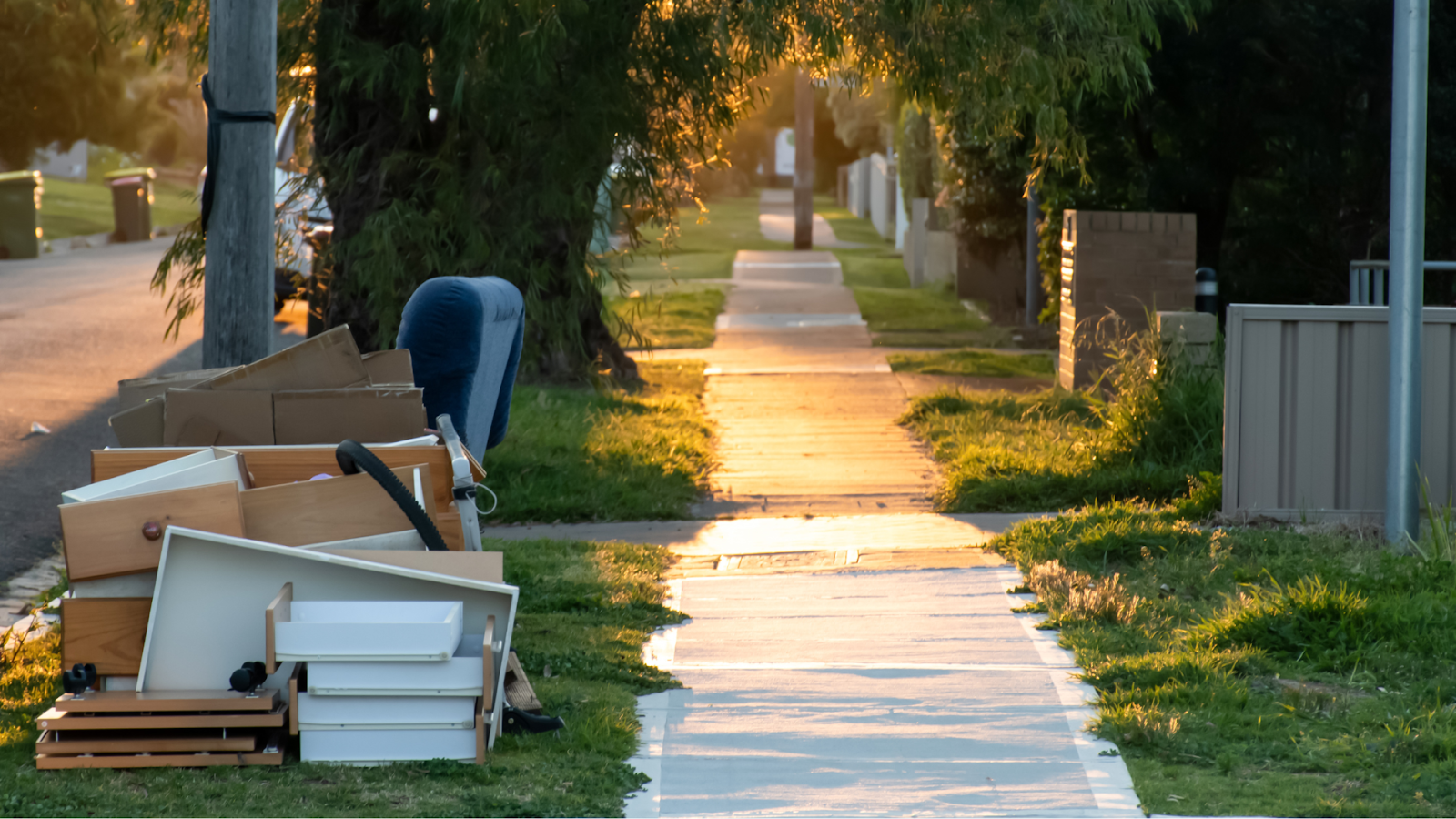In the complex world of waste management, understanding what happens to hard rubbish in Australia is key. From bulky belongings that no longer serve a purpose to electronic gadgets that have buzzed their last, these items undergo a strict process once they’re collected by councils or private handlers. Read on as we unravel the fate of hard rubbish, including:
- The nature of hard rubbish
- The significance disposing it appropriately
- The various hard rubbish collection services in Australia
- Ways to optimise your hard rubbish disposal
- The journey of hard rubbish from its collection to processing.
- Initiatives minimising the environmental footprint of hard rubbish
Key Takeaways
- Hard rubbish in Australia includes bulky items like furniture and appliances and requires special collection and disposal services due to its size and material composition.
- Proper disposal of hard rubbish is crucial for environmental protection and community health, and there are comprehensive council and private collection services available to aid residents.
- Innovative recycling and community initiatives are key to managing hard rubbish sustainably, reducing its environmental impact, and promoting a more circular economy.
Understanding Hard Rubbish in Australia
Hard rubbish is a category of waste that includes large and bulky items like old furniture, white goods such as refrigerators and washing machines, and electronic waste. Unlike regular household garbage, which is typically collected weekly by local councils, hard rubbish requires special collection services due to its size, quantity, and the type of materials it contains. This category of waste arises from various sources, from household clean-ups to small businesses and even garden waste from landscaping activities.
Dealing with hard rubbish effectively is a multi-step process that begins with you, the resident. Comprehending hard waste regulations and proper disposal techniques is vital in managing the rubbish effectively. Illegal dumping is a serious offence, and local councils often provide hard waste collection services to help residents dispose of their hard rubbish correctly. It’s not just about getting rid of garbage; it’s about doing it responsibly.
What is Hard Rubbish?
The concept of hard rubbish can be somewhat unclear. As a term, it refers to bulky waste items that are too large to fit in regular bins. But it’s not just about size. Hard rubbish also includes items that are inappropriate for standard waste collections due to their composition or hazard level.
For example, the following items are all considered hard rubbish and a form of solid waste:
- sinks
- household furniture
- appliances
- white goods, including refrigerators or washing machines
- toys
- mattresses
- carpet
- bundled branches and large green waste
While these items might be ordinary and harmless in a domestic setting, improper disposal can have severe environmental and health implications. Hence, they require special handling during collection and disposal.
Why Disposing of Hard Rubbish Properly is Important
You may be thinking, why such a big deal about hard rubbish? Is it not possible to simply discard it like any other trash? The short answer is, no.
Without proper disposal, hard rubbish can pose safety hazards, detract from local aesthetics, and become a breeding ground for vermin and pests, leading to potential health risks.
Particular items such as fridges, washing machines, and televisions can lead to environmental harm if disposed of improperly in landfills, as contaminated waste releases toxins into the environment. Even worse, illegal dumping into waterways can significantly contaminate aquatic ecosystems, adversely affecting aquatic life, water quality, and potentially compromising drinking water sources.
Adherence to hard rubbish collection guidelines goes beyond mere avoidance of penalties, it’s our collective responsibility towards the environment and future generations.
Hard Rubbish Collection Services in Australia
Disposing of hard rubbish shouldn’t be a daunting task. There are numerous hard rubbish collection options available to Australians, including scheduled or pre-booked suburb council collections, and specialist rubbish removal companies. Whether you’re in Sydney or elsewhere in Australia, there’s a service to cater to your needs.
Council Collections: What You Need to Know
Most local councils in Australia provide free hard rubbish collection services to residents, including those living in houses, terraces, and apartment buildings whether as a tenant or owner. This is sometimes known as ‘council clean up’. Each council offers slightly different services when it comes to time frames and requirements. Some municipalities may offer collection services twice per year, while others once per quarter, and others will require residents to book online in advance for collection dates available in their area.
This serves as a great option for residents who are not actively cleaning out old hard rubbish. If participating in a council collection it’s important to become familiar with the hard waste rules that pertain to your area, as every council is slightly different. For instance, residents must follow their council’s guidelines for preparing items for collection, which often include bundling small items together, attaching a note with a booking number, and complying with size restrictions. In addition, certain items like industrial and commercial waste, construction debris, hazardous materials, and excessively heavy objects are typically rejected for collection.
Hard Rubbish Removal Specialists
For those in need of more flexibility or possessing items not generally accepted by local council hard waste collections, a hard rubbish removal specialist service is an excellent alternative. Employing these services can offer enhanced scheduling flexibility, like same-day pickups, catering to residents with immediate disposal needs.
Rubbish removal specialists also provide additional help, such as helping to remove large items from the property. This is especially beneficial for those unable to transport bulky items themselves (because removing a fridge is all fun and games until you try to pick it up!). If you find yourself limited by the council’s guidelines or disposing of large amounts of hard rubbish, such as when moving house, a private rubbish removal specialist is a practical alternative. Reach out to the Paul’s Rubbish Removal team for your free quote and same-day rubbish removal today.
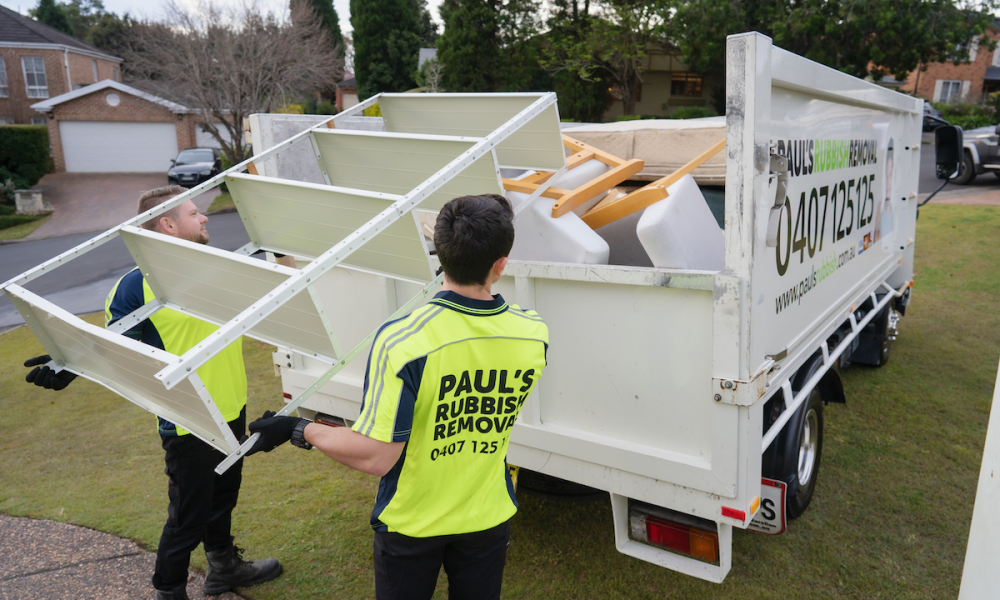
Tips for Residents: Maximising Your Hard Rubbish Disposal
As the old saying goes, ‘prevention is better than cure,’ and the same principle applies to hard rubbish. By taking steps to reduce waste and prepare correctly for hard rubbish collection, residents can ensure a smoother and more efficient disposal process.
For instance, separating items into specific categories such as mattresses, furniture, bulky household items, metals, whitegoods, and electronics can ensure a smooth rubbish collection.
Reducing Waste at Home
Minimising waste generation at home stands as one of the most impactful methods to reduce the volume of hard rubbish. Many items, from clothes to furniture, can find a new home instead of ending up in the waste stream. By donating or selling items, residents can extend the useful life of their belongings and minimise the addition of waste to landfills. In Sydney suburbs, residents use a Facebook group to offer their hard rubbish to others and can even donate mattresses to charities or online organisations.
Another effective way to reduce waste is by repurposing items. This can involve transforming furniture into new items, repairing items, or composting organic waste. For instance, you can use coffee tables as planters or cabinets as home bars. By adopting these strategies, you’re not just reducing your hard rubbish but also contributing to a more sustainable lifestyle.
Preparing for Collection
It may sound redundant, but when the moment arrives to get rid of your hard rubbish it is crucial to prepare properly. Residents should be sure to:
- Contain or tie up loose items, such as small items placed in boxes.
- Bundle and tie together garden organics.
- Cut large rugs into sections no longer than 1 metre, roll them tightly, and secure with string or tape to prevent problems with waste compactors.
To avoid any penalty associated with early disposal and illegal dumping, items for council collection must be set out in a visible spot from the street but not too early before the designated pickup. Cleaning out household appliances and ensuring that no contaminants are present can also prevent rejection during the hard rubbish collection process. For example, this means clearing out your old fridge of any food.
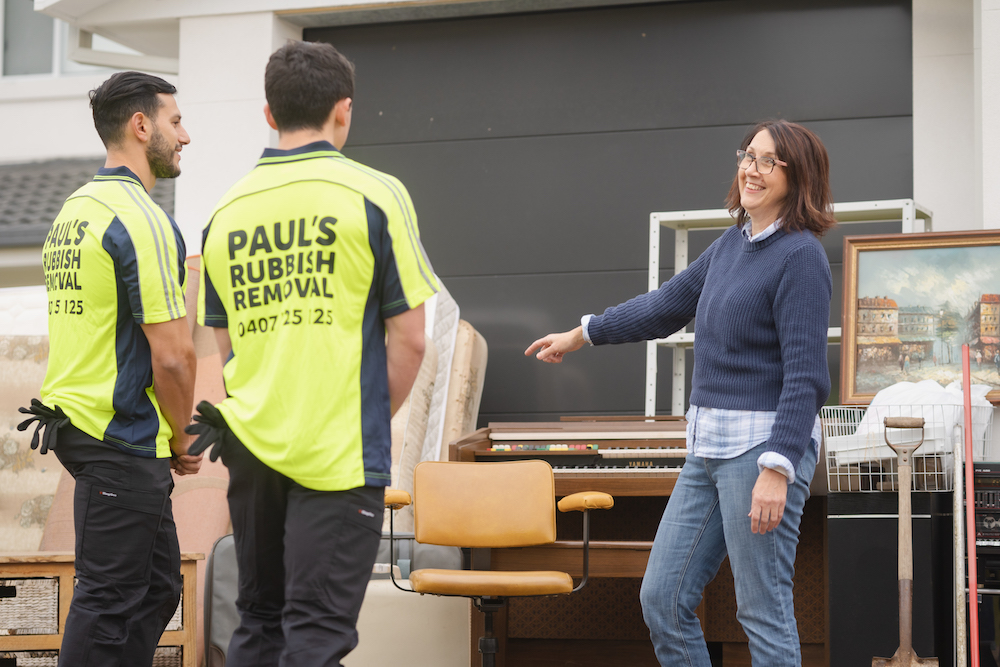
From Pickup to Processing: The Journey of Hard Rubbish
Even after your hard rubbish has been picked up, its journey is nowhere near its end. Community and local council services collaborate to ensure proper disposal and recycling of large waste items contributing to clean and livable urban environments. From the pickup point at your doorstep, hard rubbish is taken to a sorting facility or waste station. Here, it is separated and sorted into appropriate groups for recycling or disposal. Some of it might even find a new lease of life through recycling.
Sorting and Recycling
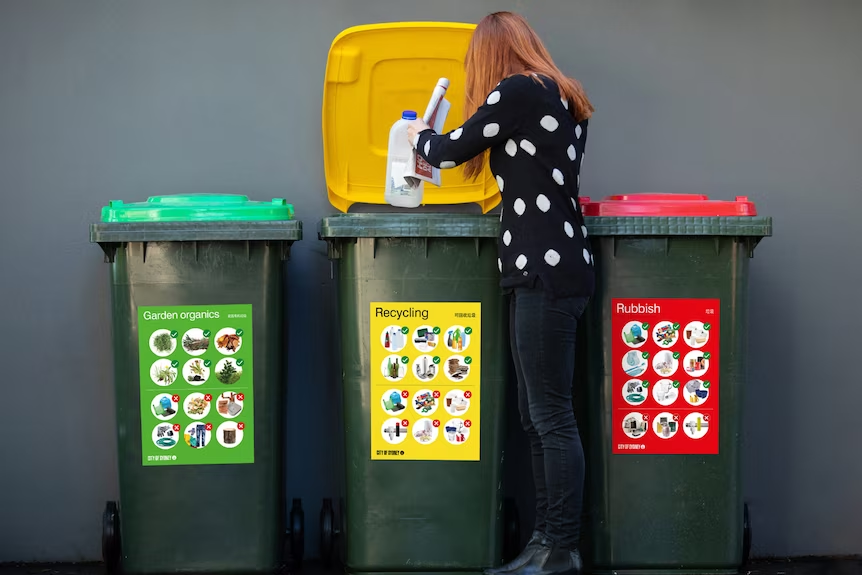
Source: City of Sydney
At the sorting facilities, hard rubbish is meticulously separated for recycling. Councils often cooperate with specialist recyclers to ensure that different types of hard rubbish like metals, e-waste, and mattresses are separated and processed efficiently.
Recyclable materials, such as metals, can be processed effectively, providing a more resource-friendly alternative to mining and manufacturing new ones. Some examples of recyclable materials include:
- Glass
- Copper
- Plastics
- Precious metals
These materials can be recycled into new products, reducing the need to extract raw materials. Even mattresses, a common element of hard rubbish, have up to 75% of their parts recyclable, highlighting the potential for reducing waste through specialised recycling initiatives.
Landfill or Second Life?
Despite rigorous attempts at recycling, some hard rubbish unavoidably finds its way to landfills, which is bad for the environment. Non-recyclable general waste is sent to landfills, while downcycling can be an alternative process for items like furniture which are turned into fuel for cement kilns. However, green waste can be composted or converted into bioenergy, reducing its impact on the environment.
However, many items can escape this fate and be given a new lease on life through different channels of repurposing and recycling. Some ways to give items a second life instead of disposal include:
- Donating still usable hard rubbish like furniture and appliances to support the community
- Repurposing items for new uses
- Recycling materials to create new products
These actions help reduce waste and support a more sustainable lifestyle.
Residents also have the option to engage with local garage sales, thrift stores, or online platforms to find or sell items for upcycling, hence diverting them from landfill.
The Environmental Impact of Hard Rubbish
The disposal of hard rubbish substantially impacts the environment. Recycling hard rubbish properly conserves natural resources, reduces landfill waste, and minimises pollution. However, improper disposal can lead to severe consequences.
Water pollution results from rubbish, such as plastics and chemicals, ending up in oceans or rivers, which harms aquatic life and contaminates freshwater supplies. When landfills containing hard rubbish release methane, they contribute to an increase in greenhouse gases, exacerbating climate change.
Tackling E-Waste
E-waste, also known as electronic waste, incorporates electronic or electrical products nearing their lifespan, such as:
- TVs
- computers
- mobile phones
- batteries
- kitchen appliances
Recycling e-waste responsibly is very important due to its hazardous components. To prevent it from contributing to landfill accumulation and its resultant environmental hazards, the New South Wales Government has implemented a ban on e-waste in landfills, enforcing its diversion to proper recycling processes.
Innovative solutions like the Australian startup Battery Pollution Technologies are making strides in e-waste recycling. This company has introduced technology focused on recovering cobalt, lithium, graphite, and nickel from batteries, achieving over 95% recovery efficiency. The recovered materials include non-renewable and valuable elements like lead, mercury, lithium, manganese, nickel, and zinc, which can be recycled multiple times. Initiatives like these emphasise the importance of specialised recycling services.
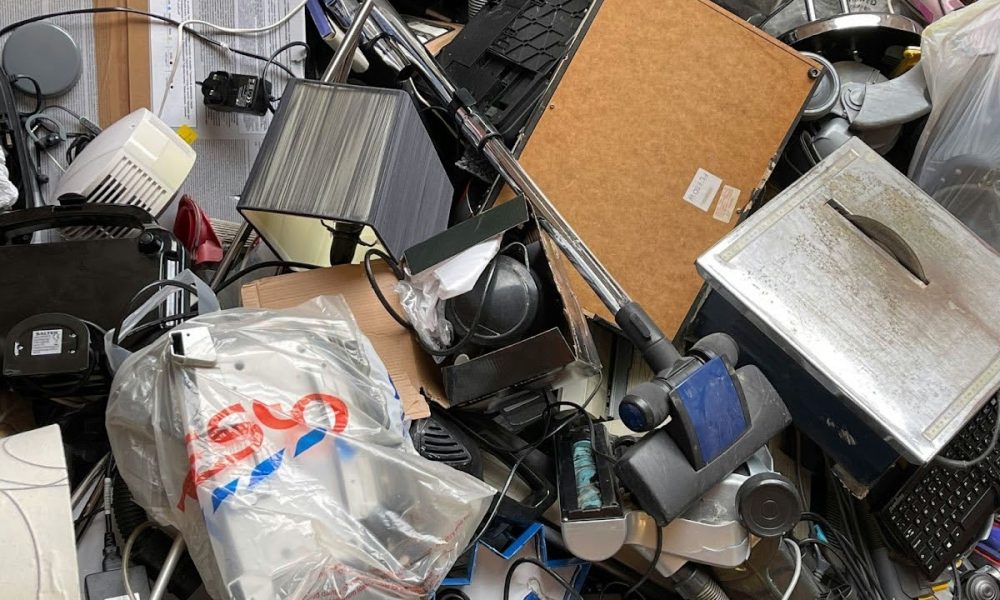
The Consequences of Illegal Dumping
Illegal dumping of hard rubbish not only spoils our environment’s natural aesthetics but also poses grave environmental and health threats. Discarded items such as furniture, white goods, and construction debris disrupt natural habitats, contributing to unsightly and unsafe conditions and the spread of invasive species.
The illegal dumping of old tires creates breeding grounds for mosquitoes and other pests, while hazardous waste like chemicals and asbestos contaminates the soil and air, posing severe health risks. An increase in vermin and pests due to illegal dumping results in a rise in diseases and health hazards for nearby human populations. Be part of the solution, not the problem.
Innovations in Hard Waste Management
Innovation stands as the cornerstone to address the challenges associated with hard waste management. This includes recycling breakthroughs, community initiatives, and national waste policies.
Companies like Replas and Terracycle are leading the way in recycling efforts in Australia by creating new products from recycled plastics, including durable outdoor furniture and upcycling waste into playground equipment.
Recycling Breakthroughs
In the realm of recycling, several advancements have taken place. For instance:
- Printer cartridges are not just discarded; their toners are repurposed for road surfaces
- Plastics get transformed into products like outdoor furniture
- Leftover inks become recycled artists’ ink
In Australia, start-ups are creating innovative solutions by upcycling discarded materials. National initiatives like the Australian Packaging Covenant Organisation (APCO) and Container Deposit Schemes are playing a significant role in reducing packaging waste and promoting responsible recycling behaviours across the country. All these efforts point to a future where hard waste is not just a problem, but also a resource.
Community Initiatives
Community initiatives hold a critical role in the management of hard waste. Residents are encouraged to:
- Find new homes for items like unwanted clothes, furniture, and appliances by donating to charities or giving them to friends and family
- Reduce reliance on hard rubbish collections
- Promote the reuse of bulky household items
Computers, accessories, mobile phones, and smart devices can be collected by community programs to be refurbished for use or disassembled for component reuse, contributing to sustainable e-waste management. These community-led projects embody the principles of reduce, reuse, recycle, and recover, aiming to significantly lower the volume of rubbish sent to landfills.
The Wrap Up
As we’ve seen, hard rubbish is a complex issue that requires careful management. It’s not just about disposing of waste; it’s about doing so responsibly and sustainably. Whether it’s adhering to council’s hard waste rules, using private collection services, or reducing waste through reuse and recycling, every effort counts.
With the ongoing innovations in hard waste management, there’s hope that we can turn this environmental challenge into an opportunity for a cleaner, greener future.
Trash Facts and FAQS
What does Australia do with its rubbish?
Australia handles its 48 million tonnes of solid waste through 2846 waste management facilities, including transfer stations, resource recovery facilities, and landfills. This allows the country to manage its material-intensive economy effectively.
What happens to rubbish that cannot be recycled?
Unfortunately, the rubbish that cannot be recycled ends up in landfills. This happens when incorrect items, such as soft plastics, are put into recycling bins. Keep an eye on what you toss, and ensure that only recyclable items go in the recycling bin!
Does rubbish get sorted before landfill?
Yes, in some communities, rubbish is sorted before landfill, either at the source or after collection, while in others, it may not be sorted at all. The level of sorting depends on the waste management system in place in that area.
What happens to rubbish after it is collected?
After rubbish is collected, the majority of items in the yellow lid bin are recycled, with 84% to 96% being recycled on average, while the rest goes to landfill due to incorrect items being put into recycling bins. Our contractors also inspect recycling bins for correct items before the recycling process.
